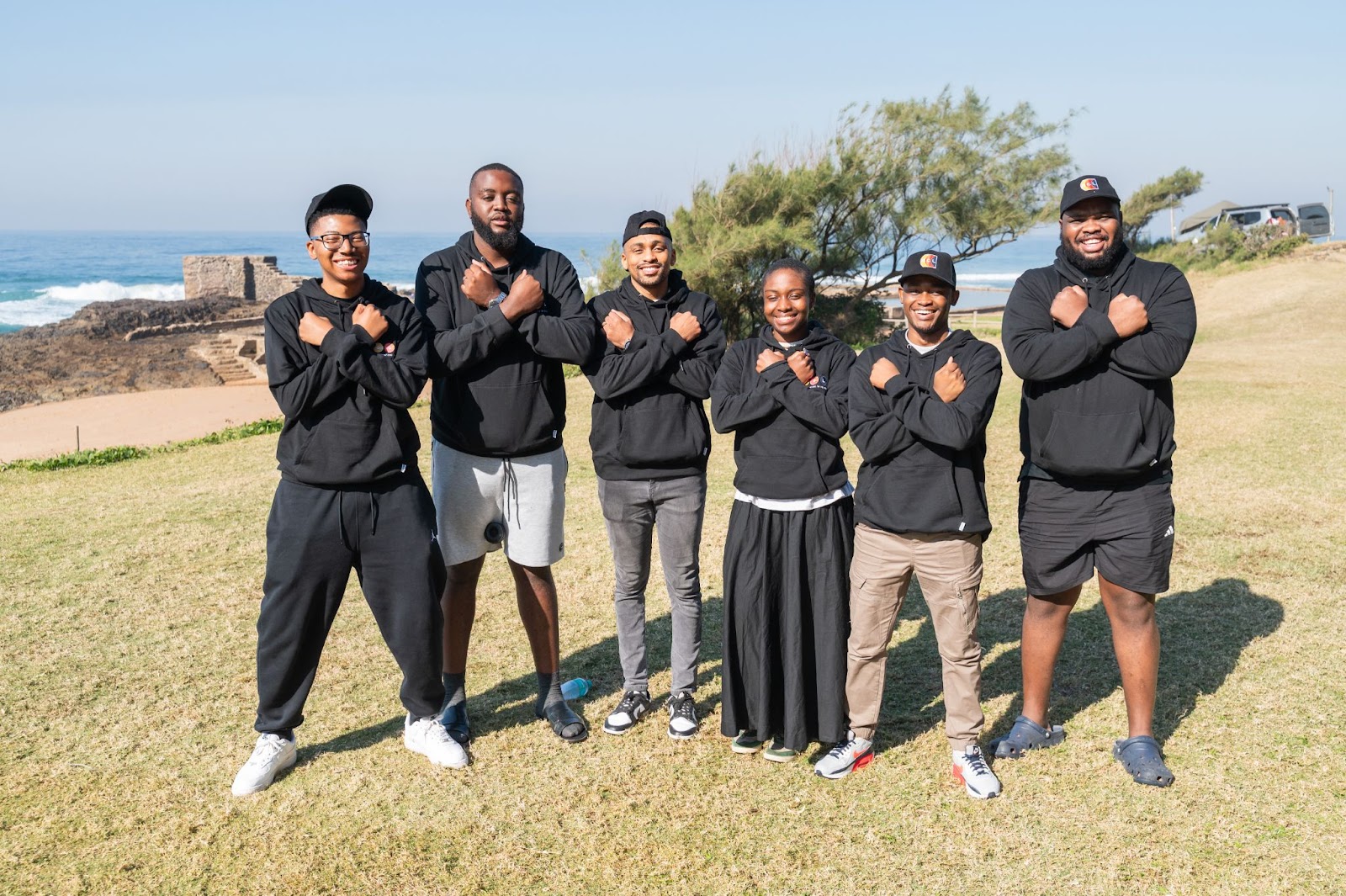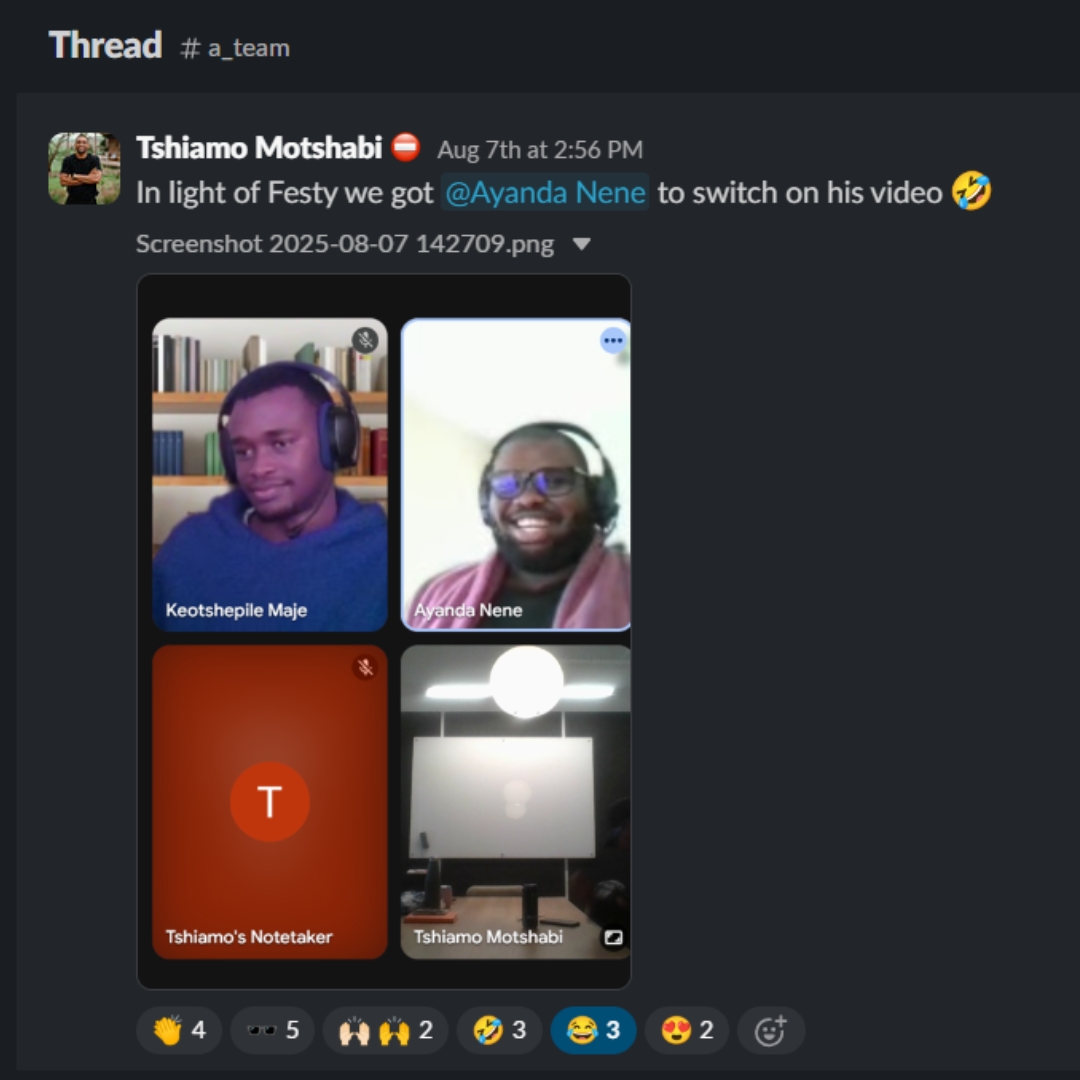Central to our development work is a commitment to building with care, precision, and purpose. Our role goes beyond delivering functional code. For us it’s about engineering tools that are scalable and built to serve communities long after deployment. By prioritising technical quality, collaborative and iterative problem-solving, and early involvement in the product lifecycle, we aim to develop solutions that have lasting public value.
Dev at OCL is as much about the team as the tools we build. That means mentorship, asking questions early, and creating space for every voice in the room. Through our team-wide support systems and more recently, our graduate program, we’re striving to grow together in a way that enables us to learn from one another and create space for each one of us to lead from where we are.
Tshiamo’s journey reflects that. He joined OCL as an intermediate developer and quickly stepped into a leadership role, mentoring others while helping build civic tech solutions with lasting public value. In this Q&A, he shares his growth story, his perspective on collaborative dev culture, and why how we build is just as important as what we build.


How did you first join OCL, and how has your role evolved?
T: I joined OCL as an intermediate developer. In the early months, it was mostly about onboarding and getting familiar with the projects already in development. There wasn’t a lot of structured learning, the expectation was to be hands-on from the start and to make decisions with guidance from Wasim, our Chief Technical Officer (CTO). He was looking for someone with leadership potential, so I was trusted with responsibility quite early on.
From there, things moved fast. Within a year, I went from intermediate to senior and then into a lead developer role. It was intense but also exciting. I joined at a time when OCL was expanding its scope, so there was room to grow quickly.
Stepping into leadership wasn’t something new for me. I’ve scouted for talent and managed teams in the past, so mentorship came naturally. In some ways, I feel like leadership always finds me, and OCL has been a space where that’s been encouraged and supported.
While Tshiamo joined OCL before our graduate programme formally existed, his own journey has helped shape how we support new talent today. In 2024, we officially launched our graduate programme welcoming three new team members across data, development, and product management. Tshiamo now leads and mentors the dev graduates, continuing a culture of shared learning and growth. Tshiamo talks about how mentorship has shaped his own path, and how he now pays it forward within the team.
How has mentorship shaped your experience at OCL, both as someone who was mentored and now as a mentor yourself?
T: It’s been a great experience working alongside Wasim and Matthew, our former CTO. Both taught me a lot, not just technically, but also about leadership. That mentorship played a big role in my growth here, and I’ve carried it forward in how I now mentor others on the team. I’ve always had a background in mentoring young minds, and I’m constantly learning from the juniors too, so that dynamic comes naturally to me.
What stands out to me about OCL’s work culture is the freedom to deliver without being micromanaged. There’s a strong sense of trust, and being able to work from home is a big bonus. The flexibility here really helps us focus on what matters.
One part of OCL’s culture that Tshiamo has especially valued is the shift to a four-day workweek. Long before it became an official policy, he had already been working a focused four-day schedule, something he found made a big difference to his productivity and well-being. When OCL institutionalised the four-day workweek in September 2024, it was a natural evolution of a culture that encourages autonomy, trust and ownership. Tshiamo’s experience reflects what many in the team have echoed: that fewer, more focused days can lead to deeper impact, better outcomes, and a healthier balance.
That same intentional impact-driven thinking is shaping how we approach product development. Over the years, we’ve grown from building one-off tools for civil society as Open Data Durban, to working on long-term embedded solutions that respond to the complexity of urban systems. Today, our technical team co-creates solutions with users, partners, and city stakeholders from the ground up. Tshiamo reflects on this evolution, sharing how the development process has matured, and why cross-functional collaboration is key to building products that last.
What’s a piece of work you’re particularly proud of, and how does it reflect the way your team approaches building tools, from user research to collaboration with design and data teams?
T: It’s hard to pick just one. Every project has its own uniqueness, but the Electricity Management Tool stands out for me. The complexity of the product and the chance to work closely with the Data Science team from the City of Cape Town was a game changer. The impact that tool has on the city is immense, and being part of something with that level of public value was incredibly rewarding.
We always try to make sure our tools are grounded in real user needs. It starts with asking: what problem are we solving, and is it truly beneficial to the public? Our partners play a big role in shaping that understanding before we even decide whether something is viable to build.
Collaboration is key throughout. I think we’re still evolving in how we work across domains, but we’re being more intentional about being involved with design and data from the very beginning. Developers need to be part of that early planning, not just for technical input, but to better understand the users and the problem we’re trying to solve.
We ended our conversation by asking Tshiamo to reflect on what advice he’d offer to new developers, how he continues to grow himself, and what he hopes to see as the team moves into the future.
What keeps you motivated as a developer, and what advice would you give to someone just starting out?
T: The one thing I’ve held on to is to always keep learning - be the shadow of what you want to become, and always be available. I attend webinars, read up on new technologies, and learn from my juniors and the broader team.
What really excites me about the future of the dev team at OCL is seeing new talent come in and grow quickly. When young developers join and you can see their progress in just six or twelve months, that’s powerful. I’d hate for anyone to look back and not see any growth. Watching the team evolve means the organisation is growing too, and I love being part of that.
At OCL, building products that have impact starts with how we build our team. As we scale, our hope is that every team member sees themselves not as someone working at OCL, but as someone helping build it. That means shaping the way we collaborate, challenge ideas, support one another, and deliver work with care. We celebrate small wins, share lessons openly, and keep our lens of humour along the way.
Stories like Tshiamo’s remind us what that looks like in practice: when people are given the space to lead, mentored to grow, and trusted to take ownership, they build more than products, they build a culture of purpose.


.jpg)
.jpg)
.jpg)





